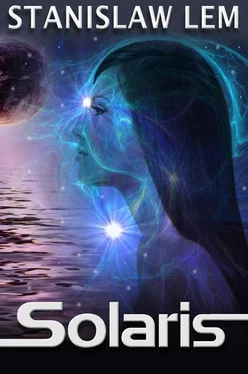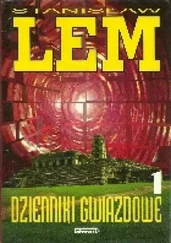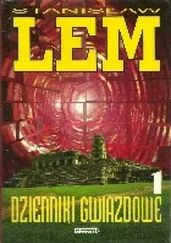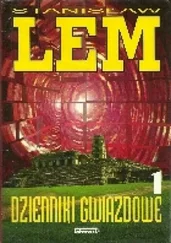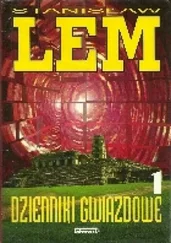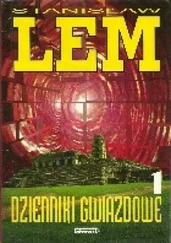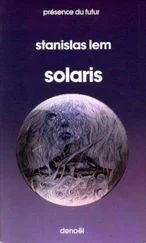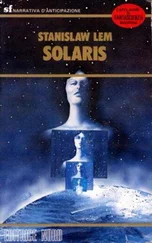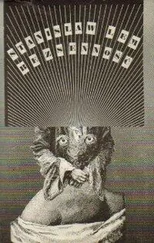Even from far off I could see something floating. Since it was light-colored, almost white, I thought it was Fechner’s space suit, especially because its shape looked human. I made an abrupt about-turn; I was afraid I’d pass the place and not be able to find it again. The figure rose upwards slightly at this moment; it looked as if it was swimming, or standing up to its waist in the ocean. I made a hurried descent, and came so close I felt the undercarriage hit something soft, the crest of a wave, I guessed, since they were high in that place. The person — yes, it was a person — was not wearing a space suit. Despite this he was moving.
Q : Did you see his face?
Berton : Yes.
Q : Who was it?
Berton : It was a child.
Q : What child? Had you ever seen it before in your life?
Berton : No. Never. In any case, not that I can recall. Besides, as soon as I drew closer — I was forty-odd yards away, maybe a little more — I realized there was something wrong with it.
Q : What do you mean?
Berton : Let me explain. At first I couldn’t put my finger on it. It was only a moment later that I realized: it was extraordinarily big. Gigantic would be more like it. It was maybe thirteen feet in length. I remember distinctly that when the undercarriage hit the wave, its face was a little higher than mine, and though I was sitting in the cockpit, I must have been a good ten feet above the surface of the ocean.
Q : If it was so big, how do you know it was a child?
Berton : Because it was a very small child.
Q : Does that answer not strike you as illogical?
Berton : No. Not at all. Because I saw its face. Besides, its body was proportioned like that of a child. It looked to me like… almost like a baby. No, that’s going too far. It was perhaps two or three years old. It had black hair and blue eyes. They were huge! And it was naked. Completely naked, like a new-born infant. It was wet, or rather slimy; its skin sort of shimmered.
This sight had a terrible effect on me. I no longer believed it could be a mirage. I’d seen it too close up. It was rising and falling with the waves, but it was also moving independently of them. It was disgusting!
Q : Why? What was it doing?
Berton : It looked, well, like something in a museum, like a doll, but a living doll. It was opening and closing its mouth and making different movements. Disgusting. Because they weren’t its own movements.
Q : Can you say what you mean by that?
Berton : I didn’t get closer than fifteen or so yards, maybe twenty would be more accurate. But I already mentioned how huge it was, and because of this I could see it extremely distinctly. Its eyes were shining and in general it gave the impression of a living child; it was just those movements, as if someone were attempting… as if someone were trying them out.
Q : Can you explain that further?
Berton : I’m not sure I can. That was the impression I had. It was intuitive. I didn’t think about it. The movements were unnatural.
Q : Are you trying to say that the arms, for example, were moving in a way that isn’t possible for human arms because of the limitations of mobility in the joints?
Berton : No. That’s not it at all. It was just… the movements made no sense. Normally any movement has some meaning, it serves some purpose…
Q : You think so? The movements of an infant don’t have to mean anything.
Berton : I’m aware of that. But an infant’s movements are chaotic, uncoordinated. They’re not specific. Whereas these movements, they were… Oh, I know! They were methodical. They took place in sequence, in groups and series. As if someone were trying to find out what the child was capable of doing with its arms, what it could do with its torso and its mouth. The worst was the face, I guess because the face is the most expressive part of the body. That face was like a face… No, I don’t know how to describe it. It was alive, yes, yet it wasn’t human. I mean, the features very much were, the eyes, the complexion, everything. But the look, the expressions, not at all.
Q : Were these grimaces? Do you know what a person’s face looks like during an epileptic seizure?
Berton : Yes, I’ve seen such a seizure. I understand. No, it was something else. In epilepsy there are contractions and twitches, while these movements were entirely smooth and continuous, graceful, you might say melodious. I can’t think of another word. And the face, with the face it was the same. A face can’t look as if one half of it is happy and the other half sad, as if one part is threatening or afraid and the other half exultant, or something like that. But with this child that’s how it was. Plus, all these movements and facial expressions took place at an amazing speed. I was only there for a short time. Ten seconds perhaps. I don’t know if it was even that long.
Q : And you’re suggesting that you managed to see all that in such a short time? Besides, how do you know how long it lasted, did you check your watch?
Berton : No. I didn’t check my watch, but I’ve been flying for sixteen years. In my line of work you have to be able estimate time to the second, I mean short stretches of time; it becomes a matter of instinct. You need it for landings. A pilot isn’t worth his salt if he can’t tell whether a particular phenomenon lasts five seconds or ten, regardless of what’s going on around him. It’s the same with observation. You learn it over the years, to take in as much as possible in the shortest time.
Q : Is that all you saw?
Berton : No. But the rest I don’t remember in as much detail. I suppose it was too powerful a dose for me. It felt like my brain was bunged up. The fog was beginning to drop and I must have increased altitude. I must have, but I don’t remember how or when I did so. It was the first time in my life I came close to flipping over. My hands were shaking so badly I couldn’t hold onto the rudder properly. I believe I was shouting and calling the Base, though I knew the radio was down.
Q : At that time did you attempt to return?
Berton : No, because when I finally reached my ceiling it occurred to me that Fechner might be in one of those holes. I know it sounds ridiculous. All the same, that’s what I thought. Since these kinds of things are happening, I thought to myself, maybe I’ll manage to find Fechner as well. So I decided to enter as many of the holes in the fog as I could. But the third time, when I climbed back up again I realized that after what I’d seen I was in no state to continue. I couldn’t do it. I have to say this, and besides, it’s no secret. I suddenly felt sick, and I vomited in the cockpit. I’d never experienced this before. I’d never felt queasy.
Q : It was a symptom of poisoning, Berton.
Berton : Maybe. I don’t know. But what I saw the third time, I didn’t make that up, that wasn’t caused by poisoning.
Q : How do you know?
Berton : It wasn’t a hallucination. A hallucination is something created by my own brain, right?
Q : That’s correct.
Berton : Exactly. But this my brain could not have created. I’ll never believe that. It wouldn’t have been capable.
Q : How about you rather tell us what it was?
Berton : First I need to know how what I’ve said so far is going to be treated.
Q : What does that have to do with it?
Berton : For me it’s fundamental. I’ve said that I saw something I’ll never ever forget. If the commission determines that what I said is even one percent plausible, such that certain research on the ocean needs to be begun, then I’ll tell everything. But if the commission is going to see it all as figments of my imagination, I won’t say another word.
Читать дальше
